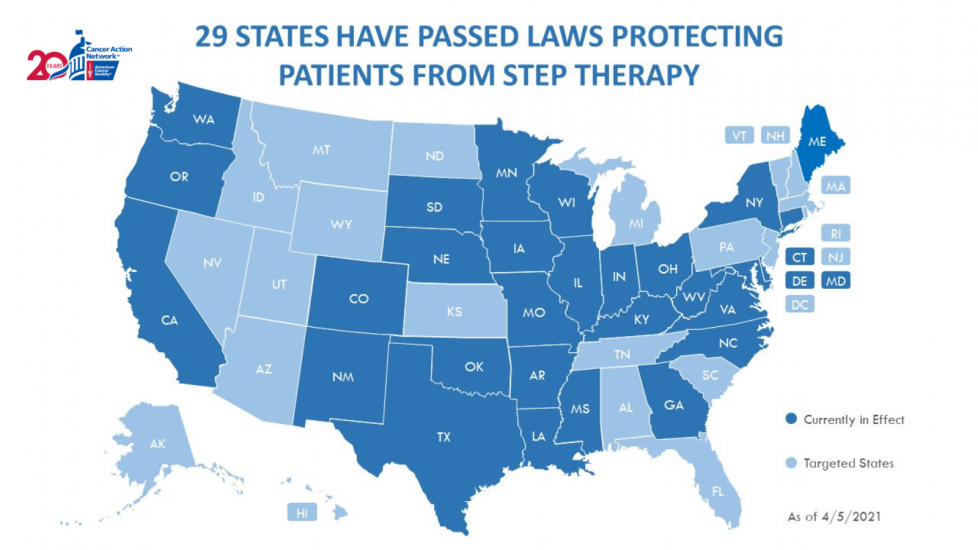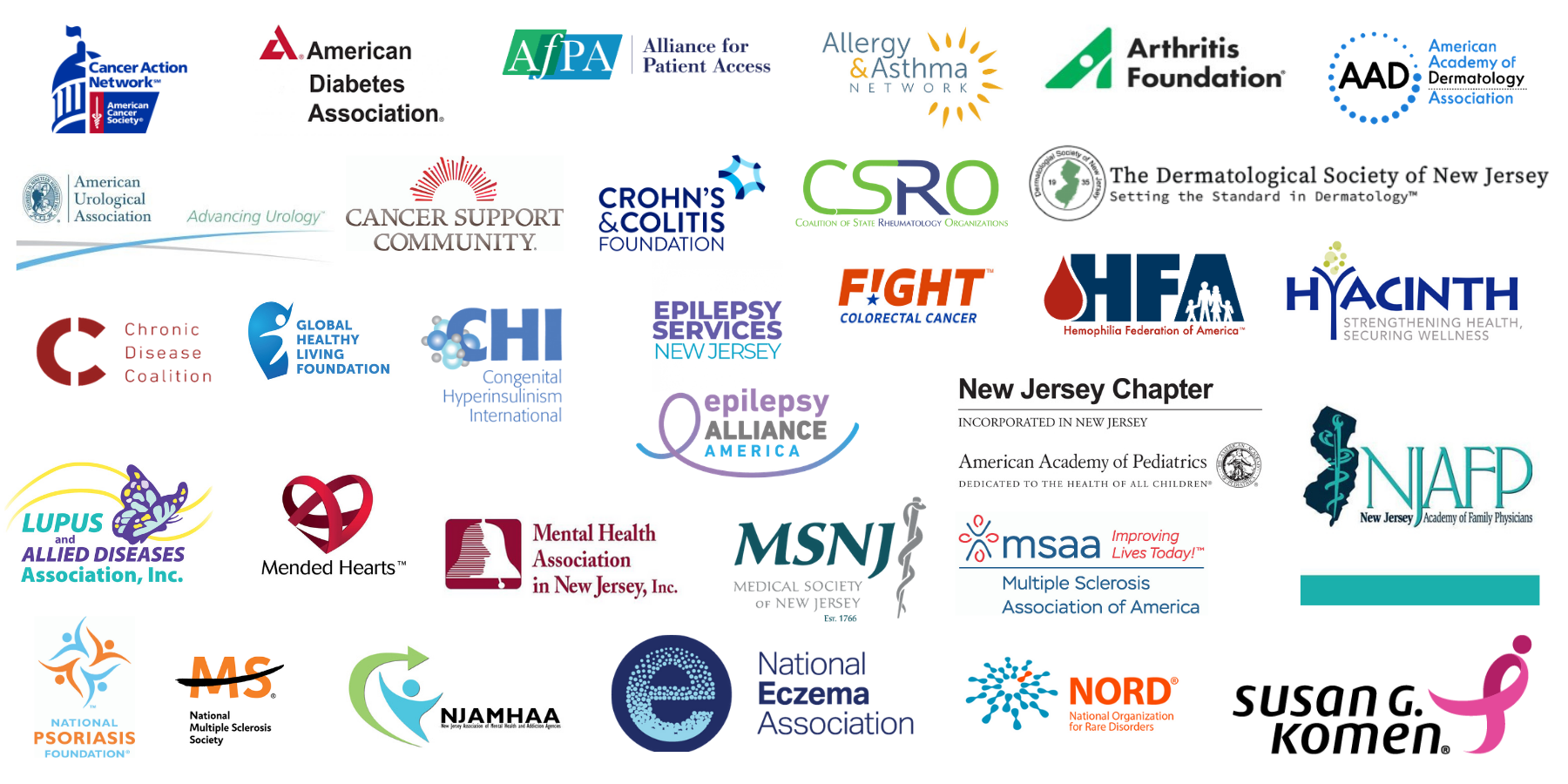It Is Time to Reform Step Therapy/Fail First Policies in New Jersey
Learn how to help pass step therapy reform today in New Jersey by visiting our Step Therapy Reform Action Center Here
We Must Put Patients First #ReformStepNJ
Step Therapy Policies (also known as Fail First) requires patients to try, and fail, on one or more prescription drugs chosen by their insurance company – not their healthcare professional - before gaining access to the drug that was recommended to treat their health condition. When implemented inappropriately, step therapy can result in patients not being able to access the treatments they need in a timely manner. This can lead to worsened symptoms and presents a particular challenge for patients suffering from life-threatening or chronic diseases.
Step therapy is often applied to New Jeseyans living with a wide range of diseases and chronic conditions including cancer, diabetes, autoimmune disorders, HIV/AIDS, epilepsy, arthritis, psoriasis, heart disease, mental illness, multiple sclerosis
Step Therapy/Fail First Policies Delay Care
A survey of more than 1,400 patients conducted in 2016 by the Arthritis Foundation revealed that over half of all patients reported having to try two or more different drugs prior to getting the one their doctor had originally ordered. Step therapy was stopped in 39 percent of cases because the drugs were ineffective, and 20 percent of the time due to worsening conditions. Incredibly, nearly a quarter of patients who switched insurance providers were required to repeat step therapy with their new carrier.
In January 2019, ACS CAN sponsored a nationwide survey of cancer patients, caregivers, and doctors regarding insurance utilization management techniques like step therapy. The survey results detail the negative effects of these policies.
Patients and caregivers reported that these policies delayed their care, increased their stress and frustration, contributed to worse outcomes and cost them more out of pocket. Doctors reported that these requirements made it harder for them to treat patients, delayed treatment and were time-consuming.
Watch this short video to learn more about step therapy.
Read these patient scenarios to understand the consequences of delays in care due to step therapy
Download the fact sheets on step therapy/fail first policies and learn more about A4815/S3051.
It is time to improve Step Therapy practices for all patients in New Jersey. Reforming Step Therapy Means Ensuring That it is:
✔ Safe for patients
✔ Clinically grounded, and
✔ Transparent to patients and health care providers
What does step therapy reform look like?
Step therapy, also known as Fail First, is a process that requires patients to try and fail one or more medications chosen by their insurer before they can access the treatment prescribed by their healthcare provider. 28 states have already enacted reforms to step therapy. See the map of those states here.
The New Jersey Legislature has introduced legislation in the Assembly (A.4815) and Senate (S.3051) that will reform step therapy.
The legislation WILL:
- Ensure step therapy protocols are based on widely-accepted medical and clinical practice guidelines.
- Create a clear and expeditious process to request a medical exception and requiring a response by the patient’s health plan within 72 hours for non-emergency and 24 hours for emergency situations.
- Provides certain circumstances for a patient to override the step therapy protocol when the drug required under the step therapy protocol is: 1) contraindicated or will likely cause an adverse reaction of physical or mental harm 2) is expected to be ineffective 3) was previously tried and discontinued due to lack of efficacy or effectiveness, diminished effect, or an adverse event 4) is not in the best interest of the patient based on medical necessity or 5) if the patient is currently stable on a medication prescribed by their healthcare provider.
The legislation will NOT:
- Require a health plan to cover any prescription drug not already on formulary and does not make any changes to the benefit design, formulary coverage, tiering of drugs or out of pocket requirements of the patient.
- Prevent insurers from using step therapy, limit the number of required steps, or require prior authorization before covering a prescription.
- Prevent insurers from requiring patients to try a generic version of a drug if it is equivalent to the brand name prescription.
29 states have already passed strong step therapy protections as of April 2021

Who supports step therapy reform?
The New Jersey Step Therapy Reform Coalition includes:

- Allergy & Asthma Network, Kelly Barta, State Advocacy Project Manager
- Alliance for Patient Access, Charlie Husser, State and Federal Policy
- American Academy of Dermatology Association, Bruce H. Thiers MD, FAAD, President
- American Academy of Pediatrics, Felicia K. Taylor, CEO, New Jersey Chapter,
- American Cancer Society Cancer Action Network, Michael Davoli, New Jersey Government Relations Director
- American Diabetes Association, Stephen Habbe, Director, State Government Affairs
- American Urological Association, Dr. Eugene Rhee, Public Policy Council Chair
- Arthritis Foundation, Steven Schultz, State Director, Advocacy & Access
- Association for Clinical Oncology, Allison Rollins, MSc, Senior Manager, State Advocacy
- Cancer Support Community, Rachel Solomon, Director, Policy
- Chronic Disease Coalition, Erin Foote Morgan, Executive Director
- Coalition of State Rheumatology Organizations, Brian Henderson
- Congenital Hyperinsulinism International, Julie Raskin, Executive Director
- Crohn’s & Colitis Foundation, Jake Johnson, State Advocacy Manager
- Epilepsy Alliance America, Jeff Sinsebox, Board President
- Epilepsy Services of New Jersey, Liza Gundell, CEO
- Fight Colorectal Cancer, Molly McDonnell, Director of Advocacy
- Global Healthy Living Foundation, Corey Greenblatt, MPH, Manager, Policy and Advocacy
- Hemophilia Federation of America, Miriam Goldstein, J.D., Policy Director & Principal Legal Counsel
- Hyacinth Foundation, Wesley McWhite III, Policy and Development Manager
- Lupus and Allied Diseases Association, Inc., Kathleen A. Arntsen, President & CEO
- Medical Oncology Society of New Jersey, Mark S. Pascal, MD, President
- Medical Society of New Jersey, Marlene M. Kalayilparampil, MHA, FHELA, Manager, Government Relations
- Mended Hearts, Andrea Baer, Executive Director
- Mental Health Association in New Jersey, Barbara Johnston
- Multiple Sclerosis Association of America, Kyle Pinion, Senior Director, Education, Healthcare Relations & Advocacy
- National Eczema Association, Michele Guadalupe, Associate Director Advocacy & Access
- National Multiple Sclerosis Society, Mara Brough
- National Organization for Rare Disorders, Annissa Reed, State Policy Manager, Eastern Region,
- National Psoriasis Foundation, Kristen Stiffler
- New Jersey Academy of Family Physicians, Claudine M. Leone, Government Affairs Counsel
- New Jersey Association of Mental Health and Addiction Agencies, Inc., Debra L. Wentz, Ph.D., President and CEO
- New Jersey Rheumatology Association, Evan Leibowitz, MD
- Susan G. Komen, Steven Raga, Northeast Regional Manager for State Policy & Advocacy
- The Dermatological Society of New Jersey, Mary Malason, Administrator
As of 3.8.21